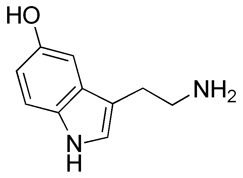Serotonin

Serotonin (5-hydroxytryptamine, or 5-HT) is a monoamine neurotransmitter synthesised in serotonergic neurons in the central nervous system and enterochromaffin cells in the gastrointestinal tract.
Serotonin is believed to play an important part of the biochemistry of depression, bipolar disorder and anxiety. It is also believed to be influential on sexuality.
The name "serotonin" is something of a misnomer and reflects the circumstances of the compound's discovery. It was initially identified as a vasoconstrictor substance in blood serum - hence "serotonin", a serum agent affecting vascular tone. This agent was later chemically identified as 5-hydroxytryptamine (5-HT) and as the broad range of physiological roles were elucidated, 5-HT became the preferred name in the pharmacological field.
Biochemistry
Serotonin is found extensively in the human gut, as well as in the blood stream.
In our body, serotonin is synthesized from the amino acid tryptophan by various enzymes as shown in the reaction below.
Serotonin taken orally does not pass into the serotonergic pathways of the CNS. This is due to the blood-brain barrier preventing serotonin in the blood stream from affecting serotonin levels in the brain. However, the amino acid tryptophan and its metabolite 5-hydroxytryptophan, from which serotonin is synthesized, are capable of crossing the blood-brain barrier. These agents are available as dietary supplements and may be effective serotonergic agents, though their efficacy is questionable.
Neurotransmission
5-HT is released from the terminal boutons of serotonergic neurons into the neuronal synapse. In the synapse it is free to diffuse across to and activate 5-HT receptors located on the dendrites of adjacent neurons.
Serotonergic action is terminated primarily via uptake of 5-HT from the synapse. This is through the specific monoamine transporter for 5-HT, 5-HT reuptake transporter, on the presynaptic neuron. Various agents can inhibit 5-HT reuptake including cocaine, tricyclic antidepressants (TCAs) and selective serotonin reuptake inhibitors (SSRIs).
Pharmacology
Main article 5-HT receptors
The pharmacology of 5-HT is extremely complex, with its actions being mediated by a large and diverse range of 5-HT receptors, many of which have poorly characterised physiological functions.
5-HT1 receptors are Gi protein-coupled, mediating cellular effects through decreasing cellular levels of cyclic adenosine monophosphate (cAMP).
5-HT2 receptors are Gs protein-coupled, mediating cellular effects through increasing cellular levels of inositol trisphosphate (IP3) and diacylglycerol (DAG).
5-HT3 receptors are ligand-gated ion channels, mediating cellular effects through increasing intracellular sodium and potassium cations.
5-HT4 receptors are Gs protein-coupled, mediating cellular effects through increasing cellular levels of cAMP.
5-HT7 receptors are Gs protein-coupled, mediating cellular effects through increasing cellular levels of cAMP.
Modulating levels of 5-HT
A variety of psychiatric medications affect serotonin levels, including the monoamine oxidase inhibitors (MAOIs), tricyclic antidepressants (TCAs), and the selective serotonin reuptake inhibitors (SSRIs).
The MAOIs prevent the breakdown of monoamine neurotransmitters (including serotonin) and therefore increase concentrations of the neurotransmitter in the brain. MAOI therapy is associated with many adverse drug reactions and patients are at risk of hypertensive crisis triggered by foods with high tyramine-content and certain drugs.
Some drugs inhibit this re-uptake of serotonin, again making it stay in the synapse longer. The tricyclic antidepressants inhibit the re-uptake of both serotonin and norepinephrine. The newer Selective Serotonin Re-uptake Inhibitors (SSRIs) have fewer (though still numerous) side effects and fewer interactions with other drugs.
Deficient (and sometimes, excessive) intake of various dietary minerals and vitamins can lead to disturbed levels of serotonin via disrupting either the production or reuptake processes.
Care must be taken in any attempt to increase serotonin levels, as a dangerous condition known as serotonin syndrome may result. This is especially a concern if multiple serotonergic agents interact to increase 5-HT levels - such as can happen when St Johns Wort is taken in combination with an SSRI.
References
- Rang HP, Dale MM, Ritter JM, Moore PK (2003). Pharmacology (5 ed). Edinburgh: Churchill Livingstone. ISBN 0-443-07145-4
